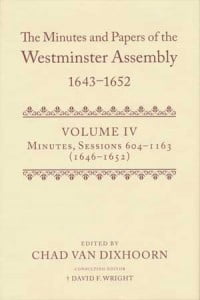All Good Things Must End
 The last numbered meeting of the Westminster Assembly, marked as “Session 1163”, met on this day, February 22d, 1649. The Assembly was never officially dissolved. Finally the last pretense of a meeting occurred on March 25, 1652.
The last numbered meeting of the Westminster Assembly, marked as “Session 1163”, met on this day, February 22d, 1649. The Assembly was never officially dissolved. Finally the last pretense of a meeting occurred on March 25, 1652.
In his History of the Westminster Assembly, (1856), William Hetherington writes of those final days:—
“The business of the Assembly was now virtually at an end. The subjects brought before them by Parliament had been all fully discussed, and the result of their long and well-matured deliberations presented to both Houses, to be approved or rejected by the supreme civil power on its own responsibility. But the Parliament neither fully approved nor rejected the Assembly’s productions, nor yet issued an ordinance for a formal dissolution of that venerable body. Negotiations were still going on with the king; and in one of the papers which passed between his majesty and the Parliament, he signified his willingness to sanction the continuation of Presbyterian Church government for three years; and also, that the Assembly should continue to sit and deliberate, his majesty being allowed to nominate twenty Episcopalian divines to be added to it, for the purpose of having the whole subject of religion again formally debated. To this proposal the Parliament refused to consent; but it probably tended to prevent them from formally dissolving the Assembly, so long as there remained any shadow of hope that a pacific arrangement might be effected with his majesty.
In the meantime many members of the Assembly, especially those from the country, returned to their own homes and ordinary duties; and those who remained in London were chiefly engaged in the examination of such ministers as presented themselves for ordination, or induction into vacant charges. They continued to maintain their formal existence till the 22d of February 1649, about three weeks after the king’s decapitation, having sat five years, six months, and twenty-two days; in which time they had held one thousand one hundred and sixty-three sessions. They were then changed into a committee for conducting the trial and examination of ministers, and continued to hold meetings for this purpose every Thursday morning till the 25th of March 1652, when Oliver Cromwell having forcible dissolved the Long Parliament, by whose authority the Assembly had been at first called together, that committee also broke up, and separated without any formal dissolution, and as a matter of necessity.
Words to Live By:
Having served its purpose, the Westminster Assembly at last closed its sessions. All good things must eventually come to an end. Ministries wax and wane. Lives come to an end. It is part of the human condition, given our fallen, sinful nature. It is part of the curse of sin. But it will not be so in heaven, when we are changed from corruptible to incorruptible. Then not just our existence, but our very reason for existence and our purpose in life will be eternal, for we will, without sin, perfectly worship and serve the one eternal Lord God.
But as it is written: “Eye has not seen, nor ear heard, nor have entered into the heart of man the things which God has prepared for those who love Him.” (1 Corinthians 2:9, NKJV)
From the Minutes and Papers of the Westminster Assembly, 1643-1652, Vol. 4, pp. 799-800, the recorded content of that last numbered session of the Westminster Assembly:—
Sess. 1163. Feb. 22, 1649. Thursday morning.
Mr Johnson to pray.
Mr Craddock be approved.
R.: Mr Savory respited till this day forthnight.
Ord[ered]: Mr Dawson be approved upon his ordination.
Ord[ered]: Mr <Horson> be approved upon his former <approbation.>
Ord[ered]: Mr Ackworth be examined.
Ord[ered]: Mr Mason be approved.
R.: The hundred pounds now to be distributed shall be distributed according to the rule observed in the last distribution.
It was done accordingly, and approved off.
“From this point forward, there are no more numbered sessions, and many different hands appear, rather than noting hands other than those of the assembly scribes, the presence of the scribal hands is noted, This session is another hand.”
The Minutes and Papers of the Westminster Assembly, 1643-1652, Chad Van Dixhoorn, editor. Oxford University Press, 2012. Volume IV, pp. 799-800.
